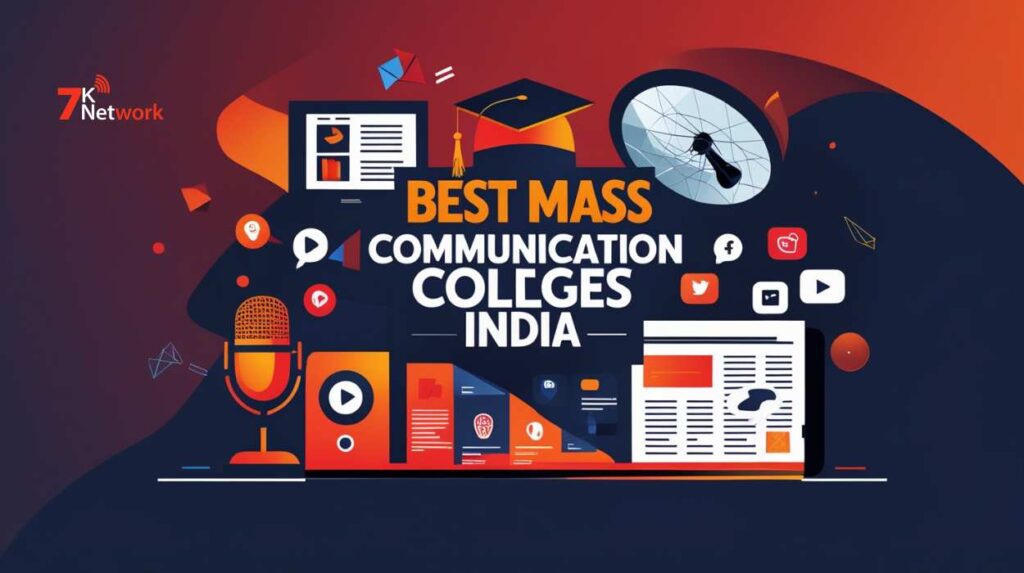Since we are in the digital era, mass communication has become a popular profession, providing job openings in journalism, advertising, public relations, film production, and digital media. As the media in India booms, the need for experts who can handle the challenges of today’s communication is growing fast. The rising demand has resulted in Indian mass communication colleges providing courses that are both useful in theory and in practical use. Best Mass Communication Colleges in India focus on shaping professionals who can meet modern media demands.
In these institutions, students get the needed knowledge to achieve success in print, broadcast, and digital types of journalism. Advertising includes many specialties, including television production, radio programs, corporate communications, handling events, and marketing on social media. Platforms like 7k Network are also contributing to the ecosystem by offering digital media solutions like News Portal Development and training for it, and opportunities for budding media professionals. Since India is becoming a center for world media, picking the right mass communication college is important for those who want to succeed in this market.
Understanding the Mass Communication Education Landscape in India
Higher education in the area of mass communication in India has developed a lot over the years, moving from being a small choice to becoming a widespread field. Nowadays, colleges of mass communication in India provide many options, from undergraduate certificates to philosophy degrees, to accommodate students with different goals and levels of education. The curriculum now covers modern subjects such as digital journalism, social media marketing, content creation, and multimedia production because of progress in the industry. Many institutions supply interactive facilities such as television studios, radio outlets, editing suites, and digital laboratories so that students get a firsthand education.
Both concepts from textbooks and what students learn in practice are important parts of this program. Many universities in India work with the media industry, enabling students to participate in internships, listen to guest lectures, and find placement after they finish their studies. Since academia and industry join forces, graduates can fulfill the demands of this industry as it changes.
Admission Process to Mass Communication Colleges in India
In India, candidates who want to study mass communication are usually put through different phases to evaluate their talents and motivation before being admitted:
- Entrance Examinations: Many top institutions hold their admission exams that check candidates’ general knowledge, awareness of current happenings, language ability, and problem-solving skills. Such tests usually cover subjects like media awareness and ideas related to communication.
- Merit-Based Selection: Some colleges consider a candidate’s 10+2 scores for undergraduate admissions and graduation grade for postgraduate admissions. The merit list is made using the total academic performance of each student.
- Group Discussions and Personal Interviews: Most times, candidates in the final round must join group discussions to analyze their skills in communicating and their confidence when speaking. By having a personal interview, one can see a person’s real personality and how interested they are in mass communication.
- Portfolio Submission: Some institutions require candidates to hand in a portfolio that displays their work, writing skills, or any projects they created in the media.
- Application Process: To apply, students should finish a web application, share academic transcripts, attach photos, and cover the application costs within a given time frame.
- Counseling and Seat Allocation: The last stage includes counseling, where students pick their desired specializations using their rank and the available seat options.
List of Top Mass Communication Colleges in India
1. Indian Institute of Mass Communication (IIMC)
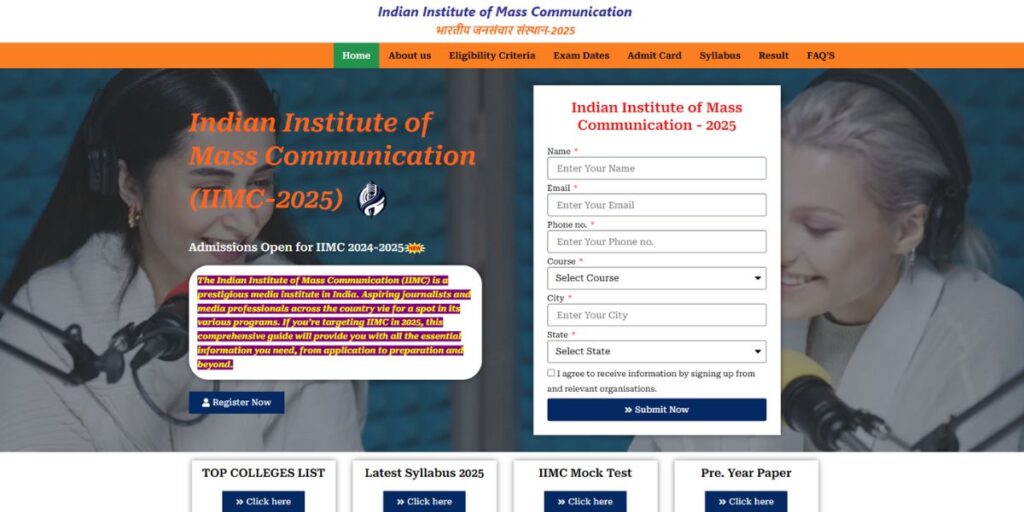
The Indian Institute of Mass Communication holds the position of India’s leading institution for mass communication education and was formed in 1965 by the Ministry of Information and Broadcasting. Year after year, the Indian Institute of Mass Communication has remained the most respected school in the field, producing several successful journalists, filmmakers, and professionals.
In addition, the institute has well-rounded courses in journalism, advertising, public relations, and radio & television production. IIMC has campuses in New Delhi, Dhenkanal, Aizawl, Kottayam, and Jammu to give quality education in various parts of India. Recognized as one of the top Mass Communication Colleges in India, its curriculum is updated often, so it stays in line with new trends and technological improvements in the textile industry.
Thanks to instructors who have worked in the business, as well as new state-of-the-art facilities, students learn a lot during their education. Indian journalism and entertainment industry has benefited greatly from the achievements of IIMC’s famous alumni.
Key Highlights:
- Established in 1965 under the Ministry of Information and Broadcasting
- Multiple campuses across India
- Strong alumni network in the media industry
- Modern facilities and equipment
- Industry-relevant curriculum
- Experienced faculty with professional backgrounds
Affiliation: Autonomous institution under the Ministry of Information and Broadcasting, Government of India
Approximate Fees: ₹2-4 lakhs per year, depending on the program
2. Christ University
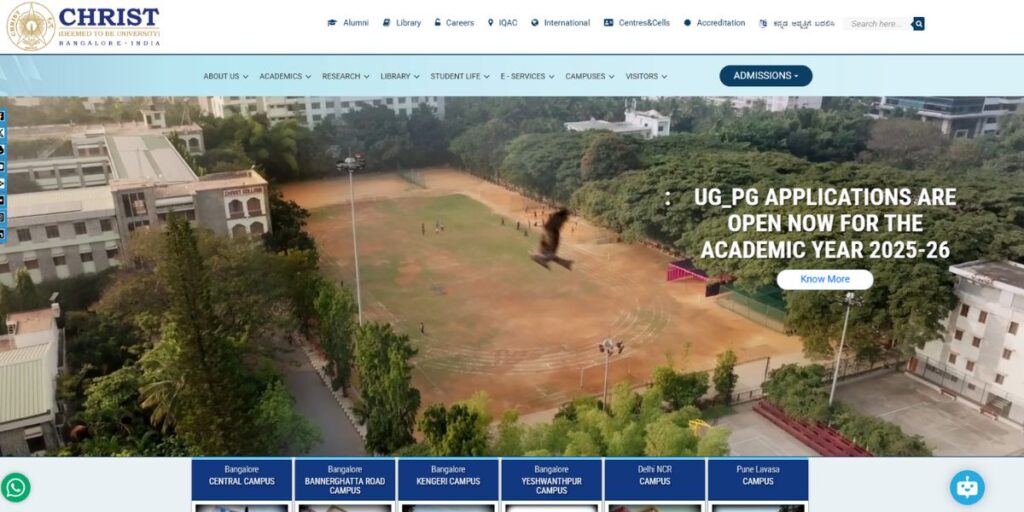
Christ University, found in Bangalore, is now one of the top places for mass communication education in South India. The university includes both traditional and new methods in its programs in communications. Christ University’s Media Studies Department gives students a complete experience in journalism, advertising, public relations, and digital media production. Practical experience is encouraged at the institution with its media labs, radio station, and television studio.
Taking part in media competitions is common for our students, who often end up on the winners’ podiums. The university continues to foster associations with major media companies, which allow students to take part in internships and have many job opportunities. As one of the prominent Mass Communication Colleges in India, Christ University encourages students to learn how mass communication works with psychology, sociology, and business management. Since the campus is so lively with different students, it encourages creativity and supports personal development.
Key Highlights:
- Innovative curriculum combining traditional and digital media
- Well-equipped media labs and studios
- Strong industry connections and placements
- Active participation in media competitions
- Interdisciplinary approach to education
- Vibrant campus life and diverse community
Affiliation: Deemed University status under UGC
Approximate Fees: ₹3-5 lakhs per year
3. Symbiosis Institute of Media and Communication
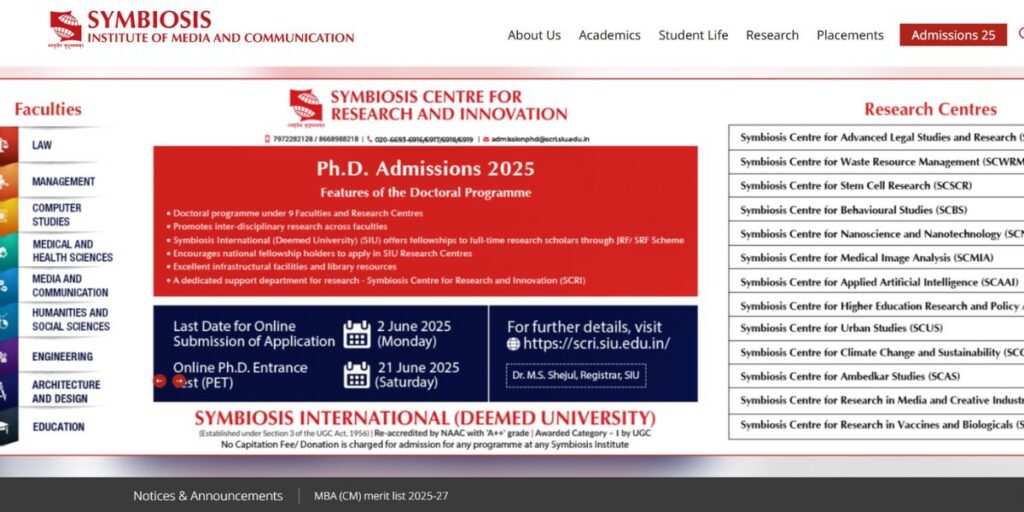
Being part of the internationally recognized Symbiosis International University, Symbiosis Institute of Media and Communication helps students get ready for changes in the media industry. In Pune, the institute only offers courses for journalism, mass communication, and digital communication. Students are required to use everything they have learned in actual assignments, live work projects, and real internships.
Various advanced facilities are accessible to students, for example, the newsrooms, radio studios, television sets, and digital editing rooms. Many of the institute’s teachers are seasoned media workers who share their professional knowledge in class. Symbiosis collaborates with major media companies to give students chances to network and build their profiles. As one of the best Mass Communication Colleges in India, the institute’s emphasis on research and new developments drives students to investigate new aspects of mass communication and support its progress.
Key Highlights:
- Part of prestigious Symbiosis International University
- Specialized courses in various media disciplines
- State-of-the-art facilities and equipment
- Industry partnerships and networking opportunities
- Research-oriented approach
- Strong placement support and career guidance
Affiliation: Symbiosis International University (Deemed University)
Approximate Fees: ₹4-6 lakhs per year
4. Asian College of Journalism
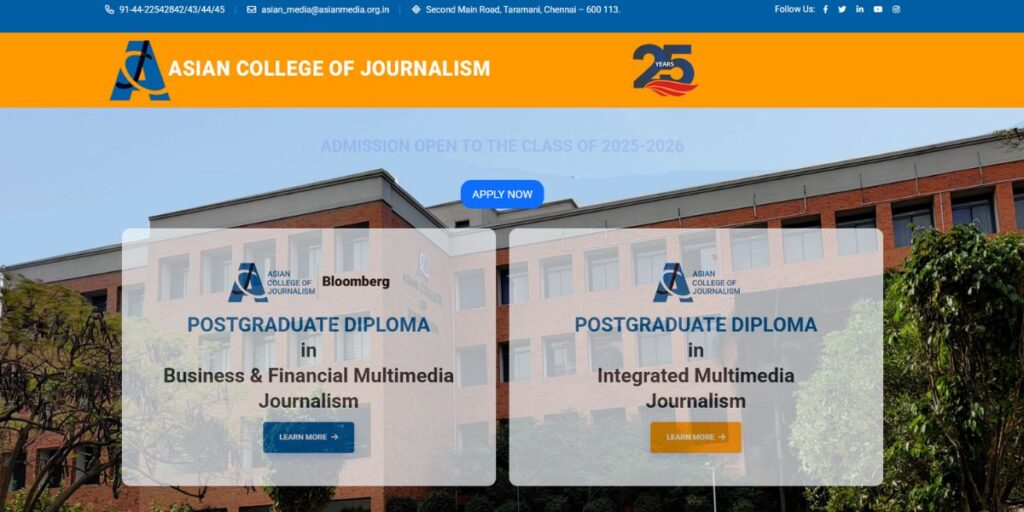
Set up in Chennai, the Asian College of Journalism is known as a leading institution for learning journalism in India. Intensive programs at the college teach students to be professional journalists ready to work in many forms of media. Curriculum at ACJ leaves much to hands-on work using newsroom simulations, field assignments, and projects that involve multimedia.
This institution continues to keep its academic standards high and admission limited, so students compete with one another. Personal support and advice are available to students because of small class sizes. Because of strong relationships with various media industries, college students have access to internships at famous newspapers and television, and digital media. Recognized as one of the top Mass Communication Colleges in India, ACJ produces graduates who are in great demand due to their training in journalistic ethics, strong research skills, and multimedia proficiency.
Key Highlights:
- Specialized focus on journalism education
- Intensive practical training programs
- Small class sizes for personalized attention
- Strong industry connections and internships
- High academic standards and selective admissions
- Excellent placement record in media organizations
Affiliation: Autonomous college affiliated with the University of Madras
Approximate Fees: ₹8-12 lakhs per year
5. Savitribai Phule Pune University

Its Department of Communication and Journalism helps provide thorough mass communication programs at Savitribai Phule Pune University. The university has both levels of courses dedicated to learning about print journalism, broadcast media, advertising, and public relations. It puts practice before theory by making use of its media labs, radio station, and student newspapers. Many students work outdoors, take part in industry visits, and work on team projects in media places.
As one of the well-regarded best Mass Communication Colleges in India, students at the university learn from theory and practical experience, giving them options for many media careers. The faculty pool consists of well-experienced journalists and professionals who offer useful information about media work. Because the university is based in Pune, students can access and study the area’s leading media platforms.
Key Highlights:
- Comprehensive undergraduate and postgraduate programs
- Well-equipped media labs and facilities
- Community radio station for practical training
- Regular industry visits and collaborative projects
- Experienced faculty with media backgrounds
- Strategic location in a major media hub
Affiliation: State University recognized by UGC
Approximate Fees: ₹50,000-1 lakh per year
6. Jamia Millia Islamia
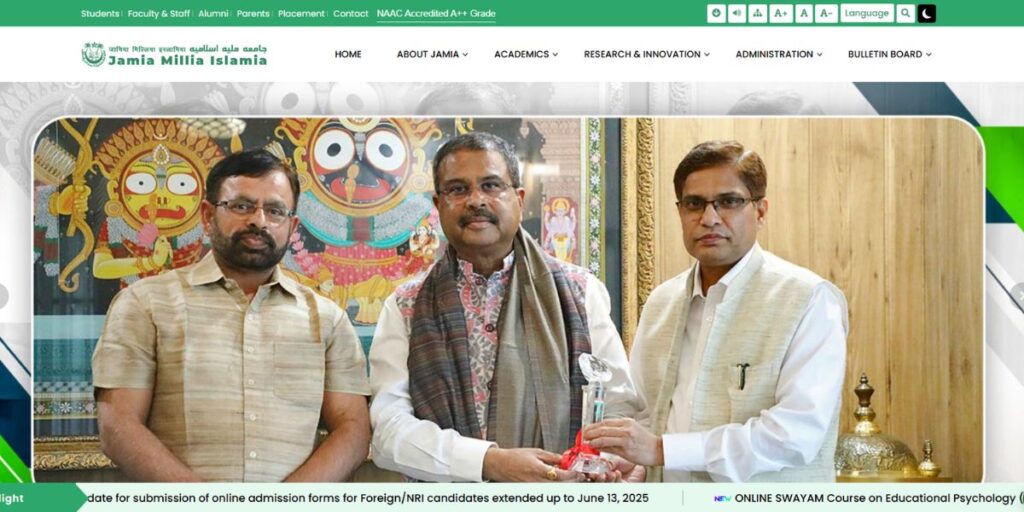
Opened long ago, the AJK Mass Communication Research Centre of Jamia Millia Islamia is highly respected for teaching mass communication. Started in 1982, the center has regularly sent out alumni who have strongly influenced the growth of Indian journalism. The institution runs both undergraduate and postgraduate levels of study in mass communication, focused on journalism, advertising, public relations, and making television programs. As one of the top mass comm colleges with practical training, the curriculum at the center helps students by showing them how communication works in theory and how it is applied in practice.
Students get the use of up-to-date tools such as digital newsrooms, television studios, and equipment for film and audio. There are skilled teachers and experienced workers in the industry who help students achieve their goals. Because Jamia’s campus is both diverse and inclusive, students there are inspired to think critically and show creativity.
Key Highlights:
- Established in 1982 with a rich academic heritage
- Comprehensive programs with multiple specializations
- Modern facilities and equipment
- Experienced faculty from academia and industry
- Diverse and inclusive campus environment
- Strong alumni network in the media industry
Affiliation: Central University under UGC
Approximate Fees: ₹30,000-60,000 per year
7. KC College
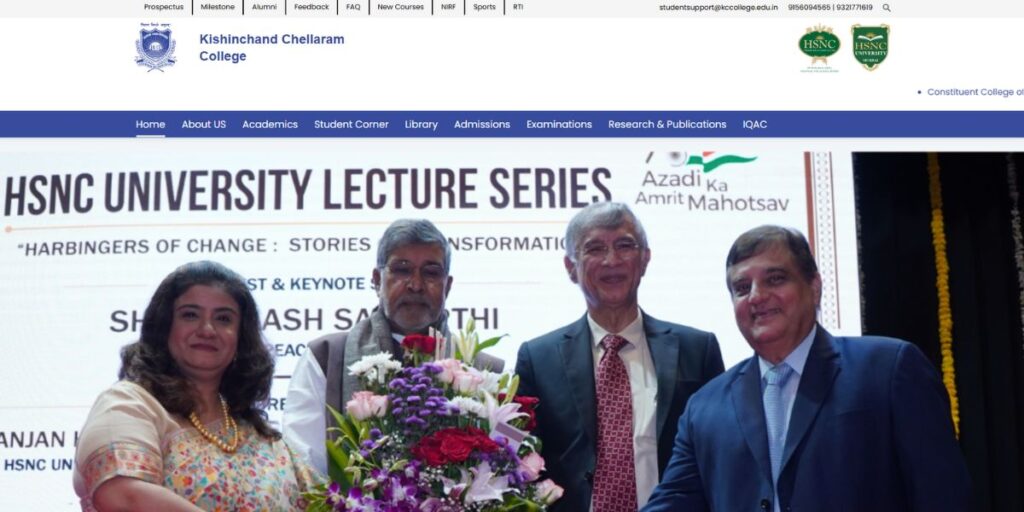
One can find quality mass communication education at KC College in Mumbai, India’s biggest center for entertainment. Counted among the top media colleges in Mumbai, the college offers mass media students many chances to work in journalism, advertising, public relations, and filmmaking. This institution has an advantageous place in Mumbai that allows students to link with the entertainment industry, media, and advertising businesses.
At KC College, students develop practical skills by doing internships, participating in industry projects, and learning by producing media materials. There are solid ties between the college and media professionals, making it easier to arrange guest lectures, workshops, and job placements for students. Students enjoy the many opportunities in Mumbai’s media sector, like exposure to Bollywood, television, and online media.
Key Highlights:
- Located in Mumbai, India’s entertainment capital
- Excellent access to the entertainment and media industries
- Strong industry relationships and networking opportunities
- Practical learning through internships and projects
- Exposure to Bollywood and television production
- Guest lectures and workshops by industry professionals
Affiliation: Affiliated to the University of Mumbai
Approximate Fees: ₹1-2 lakhs per year
8. Lady Shri Ram College For Women–Delhi University (LSR–DU)
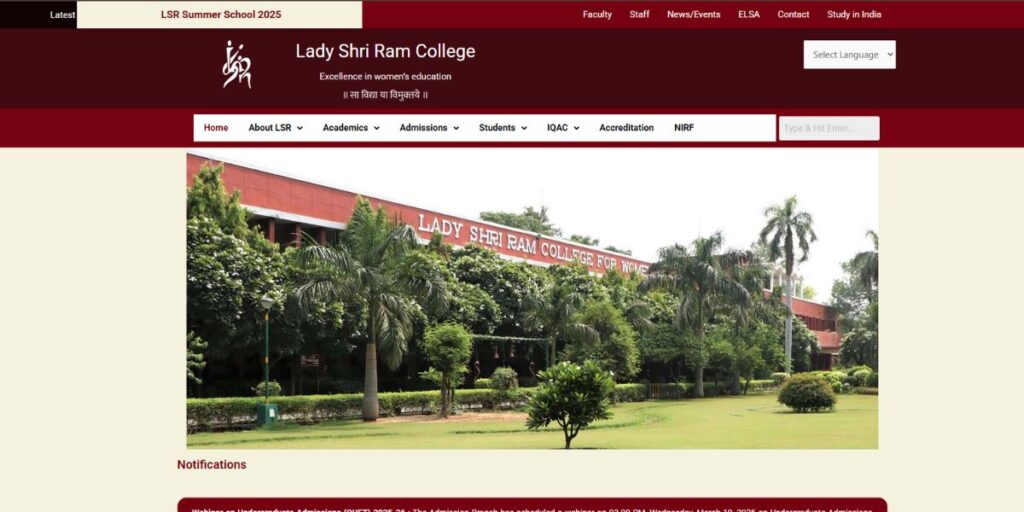
Lady Shri Ram College, which is in Delhi University, runs a top-ranking mass communication program designed for women. Recognized among the best journalism colleges in India, many of the female journalists and other media professionals working today in Abu Dhabi graduated from the college’s outstanding Department of Journalism. At LSR, students study hard and get real experience while focusing on ethical journalism and responsibility toward society.
Students at the college benefit from updated newsrooms, audio-visual gadgets, and digital editorial spaces. Students are involved in a variety of co-curricular events, for instance, producing college publications, participating in media festivals, and joining in university competitions with other institutions. Being situated in Delhi means students can get many internships at well-known media and government organizations, plus NGOs. Current students look up to LSR’s famous alumni who work as editors and reporters.
Key Highlights:
- Prestigious women’s college under Delhi University
- Emphasis on ethical journalism and social responsibility
- State-of-the-art facilities and equipment
- Strong alumni network of successful women journalists
- Excellent internship opportunities in Delhi
- Active co-curricular and media activities
Affiliation: Affiliated to the University of Delhi
Approximate Fees: ₹30,000-50,000 per year
9. Amity University Noida
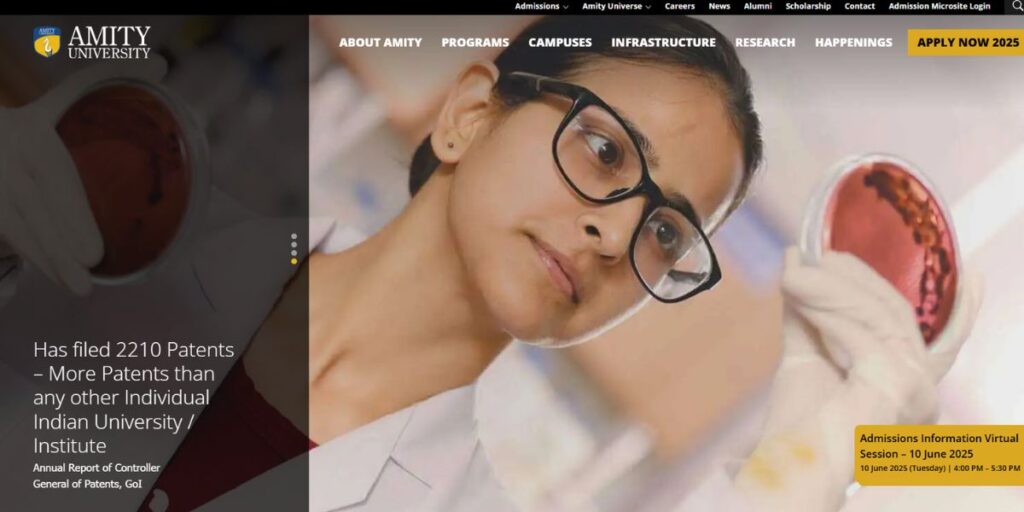
Amity University’s School of Communication teaches a wide range of mass communication programs that combine the old and new techniques of media. Widely regarded among the best mass communication colleges in India, the university gives students the chance to use up-to-date equipment such as television studios, radio stations, and digital media labs. The curriculum at Amity is made to follow industry norms, including new trends in online journalism, marketing via social media, and content creation.
Miracost University builds close ties with media giants that make placement and internships possible for its students. Experienced professors share their knowledge and backgrounds in many different fields. Research and innovation being emphasized at the university inspire students to try new ideas in mass communication and help make progress.
Key Highlights:
- Comprehensive programs blending traditional and digital media
- Modern facilities, I ncluding studios and labs
- Industry-relevant curriculum with emerging trends
- Strong industry partnerships and placements
- Experienced faculty with diverse backgrounds
- Research and innovation focus
Affiliation: Private University recognized by UGC
Approximate Fees: ₹4-7 lakhs per year
10. Madras Christian College
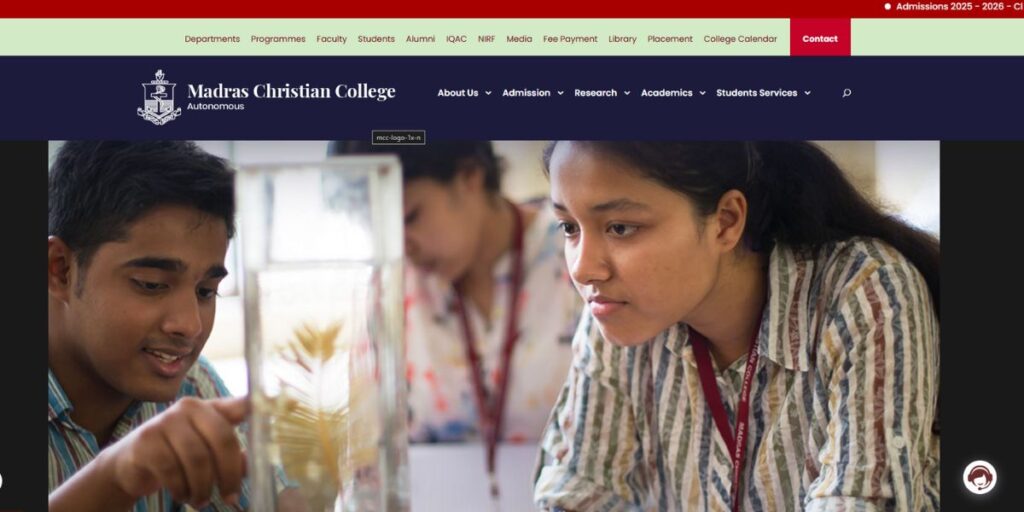
This famous and old college, Madras Christian College, has a Department of Visual Communication that focuses on delivering superior mass communication education. Counted among the best visual communication colleges in India, it offers both undergraduate and graduate programs that place importance on how to tell stories and use different media through technology. MCC teaches students both theory and practical skills so they are ready for work in television, marketing, communication, and digital media.
There are accomplished media professionals on the college’s teaching staff. Students can use well-stocked studios, editing rooms, and new technology during their classes. The solid reputation of the college makes it simple for students to find good internships and more chances to succeed in the media sector.
Key Highlights:
- Historic institution with a strong academic reputation
- Emphasis on visual storytelling and multimedia production
- Combination of theoretical knowledge and practical skills
- Experienced faculty from media backgrounds
- Well-equipped studios and modern technology
- Strong alumni network and industry connections
Affiliation: Affiliated to the University of Madras
Approximate Fees: ₹2-3 lakhs per year
Factors to Consider When Choosing Mass Communication Colleges in India
Keep these important points in mind while picking mass communication colleges in India:
- Faculty Expertise and Industry Experience: Pick institutions where the teachers are experts, are involved in media, and can guide students with their experiences.
- Infrastructure and Facilities: Check the access to the latest studios, editing rooms, news centers, radios, and specialized digital equipment that are important for learning.
- Industry Connections and Placement Support: Look into the college’s connections with the media world, the internship programs it offers, and its previous achievements in getting students hired in top firms.
- Curriculum Relevance and Specialization Options: Make sure the curriculum includes matters like social media marketing, digital journalism, and multimedia production, since these are important in today’s media sector.
- Location and Networking Opportunities: You should attend colleges in Mumbai, Delhi, and Bangalore that offer more chances to meet people from the industry and better networking opportunities.
- Accreditation and Recognition: Confirm that the place of education is certified by UGC and the different bodies required for your certificate’s validity and easy acceptance in jobs.
Eligibility Criteria for Mass Communication Admission in India
You need to check the qualifications required by mass communication colleges in India to help you decide on your studies:
- Educational Qualification: For undergraduate courses, applicants should complete 10+2 from a board recognized by higher education, and for postgraduate courses, they need a bachelor’s degree in any specialization.
- Minimum Percentage Requirements: Most schools expect students to get 50-60% in required tests, yet this guidance may change according to the institution and may also be relaxed for students from reserved categories.
- Age Limitations: Undergraduate programs may only accept students who are 17 to 25 years old, and postgraduate programs may set the limit at 30, depending on each college’s rules.
- Testing for Entrance: A lot of prestigious colleges carry out exams to assess candidates’ general knowledge, current affairs, English, and analytical skills.
- Language Proficiency: Since programs are usually in English, you must be able to speak and write it well to do well in the business world.
- Additional Requirements: Some colleges set other requirements, such as taking part in interviews, discussing in groups, submitting a portfolio, or writing a statement of purpose based on their program and institution rules.
Conclusion
There are many opportunities for people interested in media, journalism, and communication at Indian colleges of mass communication. There have been important changes in journalism, as it builds on its main principles and conforms to ethical rules, with technology playing a key role.
At leading institutions, students are taught both concepts and practical skills to be ready for exciting work opportunities in today’s media world. Before you pick a mass communication college in India, pay attention to the skills of the faculty, the available facilities, the institution’s business links, and how it supports students’ job search.
Preparation is very important during the admission process, mainly for entrance exams and job interviews. The fast expansion of India’s media industry means that people trained in quality mass communication programs can do valuable work in journalism, advertising, public relations, and digital media. People in this field must stay dedicated, creative, and keep learning as things progress in technology and the preferences of viewers change. Receiving strong training from top mass communication colleges in India guarantees a satisfying and important role in media and communication.
FAQs
What is the average duration of mass communication courses in India?
Usually, undergraduate courses take 3 years to finish, but postgraduate courses take 2 years. Some places offer diploma courses that last one year for working professionals.
Are there any specific entrance exams for mass communication colleges?
Whereas various institutions conduct their entrance examinations, a number of them take test scores from the JMI Entrance Exam, DUET, or exams held by only those institutions.
What job opportunities can students expect after completing a mass communication course in India?
People who graduate can work in journalism, advertising, public relations, film production, digital marketing, corporate communication, and content creation for different types of media.
Do mass communication colleges provide internship opportunities?
Yes, recognized institutions usually have good links with various industries and make it compulsory for students to undertake internships at newspapers, television, advertising agencies, and companies in digital media.
What is the eligibility criteria for UG/PG courses?
- UG (BA/BJMC/BMM): 10+2 pass, typically with 45–60% aggregate.
- PG (MA/PG Diploma): Undergraduate degree in any stream with ≥50–55%
Which entrance exams are needed?
- PG: IIMC Entrance, XIC OET, FTII JET, ACJ, MASCOM, SET.
- UG: CUET, IPU CET, MU-OET, JMI entrance, etc.
What is the course duration?
- UG: 3 years. PG degree: 2 years.
- PG diplomas vary between 1–2 years.
- Certificates/diplomas: 4 months–2 years .
What are top recruiters and placement packages?
Employers include Times Group, NDTV, India Today, BBC, Zee, All India Radio, Star, Outlook; starting salaries range from ₹12,000–₹60,000/month (~₹2–6 LPA) .
PG diploma vs MA vs PG degree – which to pick?
- PG Diploma: shorter, industry‑focused.
- MA/PG Degree: broader academic grounding; PhD possible.
Choice depends on career goal: academic vs industry .

